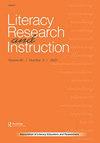支持初学K-2教师识字自我效能:农村学校早期识字教师诱导
IF 1.1
Q3 EDUCATION & EDUCATIONAL RESEARCH
引用次数: 2
摘要
摘要本研究在16个高需求、主要为农村学区的扫盲诱导项目中,探讨了159名(N = 159)初学K-2教师扫盲教学自我效能感的一年发展。调查结果显示,新教师识字教学的自我效能感在全年显著增长。教师对多管齐下的具体归纳支持的满意度在年中和年底与素养自我效能感存在不同的关系。补充、学校支持的存在对识字自我效能感没有调节作用。教师执照状况对全年扫盲自我效能感有不同的调节作用。本文讨论了支持初任教师自我效能感对识字教学的影响。这些结果增加了对农村高需求学校新教师识字教学自我效能感如何随时间发展的有限研究。本文章由计算机程序翻译,如有差异,请以英文原文为准。
Supporting Novice K-2 Teachers’ Self-Efficacy for Literacy: Early Literacy Teacher Induction for Rural Schools
ABSTRACT This study explored the year-long development of 159 (N = 159) novice K-2 teachers’ self-efficacy for literacy instruction, within a literacy-specific induction initiative with sixteen high-need, predominantly rural school districts. Findings reveal novice teachers’ self-efficacy for literacy instruction grew significantly throughout the year. Teachers’ satisfaction with specific induction supports in the multi-pronged initiative held various relationships with literacy self-efficacy at the middle and end of the year. The presence of supplemental, school-based supports had no moderating impacts on literacy self-efficacy. Teachers’ licensure status held various moderating influences on literacy self-efficacy throughout the year. Implications for supporting novice teachers’ self-efficacy for literacy instruction are discussed. Results add to the limited research examining how novice teachers’ self-efficacy for literacy instruction develops over time in rural, high-need schools.
求助全文
通过发布文献求助,成功后即可免费获取论文全文。
去求助
来源期刊

Literacy Research and Instruction
EDUCATION & EDUCATIONAL RESEARCH-
CiteScore
2.70
自引率
8.30%
发文量
18
期刊介绍:
Literacy Research and Instruction (formerly Reading Research and Instruction), the official journal of the College Reading Association, is an international refereed professional journal that publishes articles dealing with research and instruction in reading education and allied literacy fields. The journal is especially focused on instructional practices and applied or basic research of special interest to reading and literacy educators. Peer Review Policy: All articles in this journal have undergone rigorous peer review, based on initial editor screening and anonymous refereeing by reviewers.
 求助内容:
求助内容: 应助结果提醒方式:
应助结果提醒方式:


